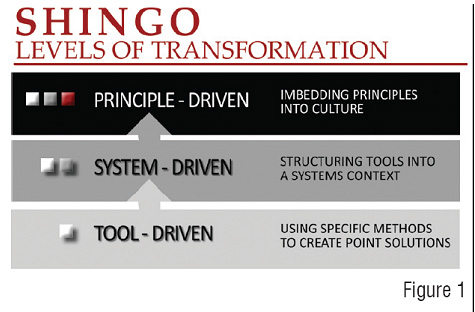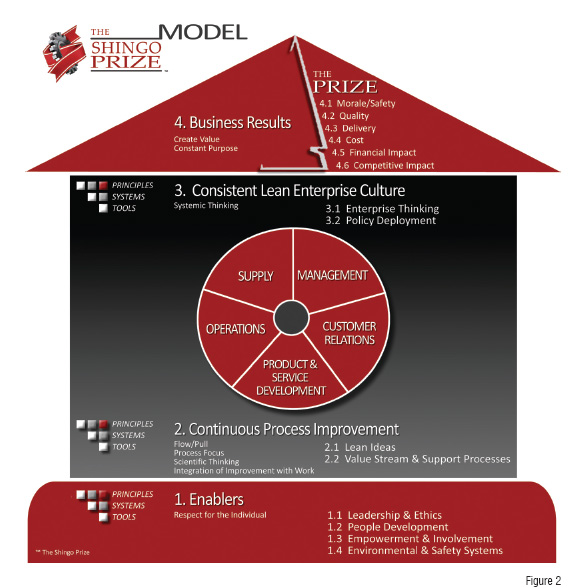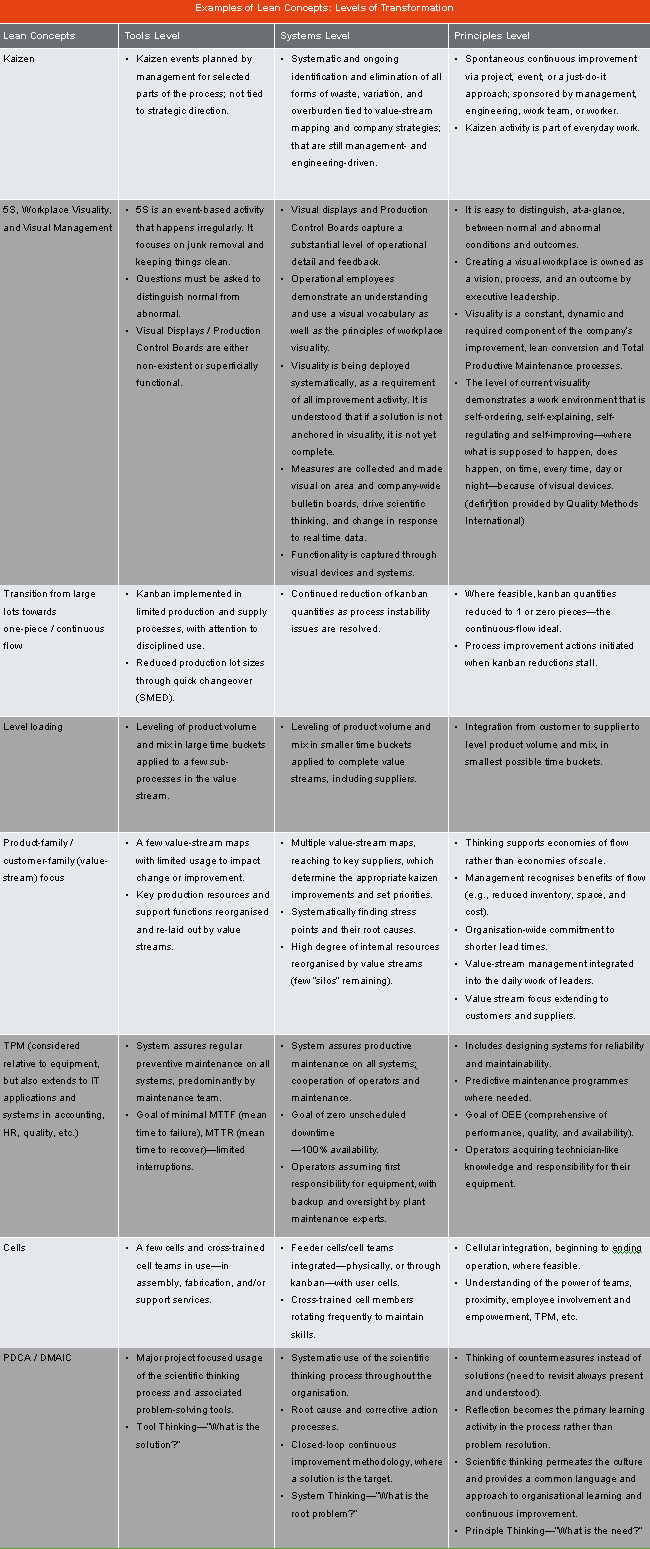True innovation is not achieved by superficial imitation or the isolated or random use of lean tools & techniques and systems (\"know how\"), but instead requires the \"know why\"-i.e., an understanding of underlying principles.
For 20 years The Shingo Prize has educated, assessed and recognised operational excellence in outstanding companies. What makes these organisations stand out and challenge their paradigm? What tools and techniques are they using-what is their silver bullet?
Shigeo Shingo, a management consultant and a practicing engineer, grasped that true innovation and transformation is not achieved by superficial imitation or the isolated or random use of tools & techniques and systems ('know how'), but instead requires the 'know why'-i.e. an understanding of underlying principles.
The Shingo Prize Approach is based on the lean management concepts taught by Shigeo Shingo. Shingo recognised vital management philosophies and shared them through his many books. His teachings describe three levels of business improvement, which we refer to as levels of transformation: Principles, Systems, and Tools & Techniques (Figure 1).

As organisations begin a lean transformation, it is usually at the Tools & Techniques level in specific areas of the organisation. Many organisations start with 5S, Visual Management, and Kaizen events. These tools improve what is currently being done, but lack a structured approach and sometimes create a disconnect to the ultimate purpose if not evolved to the next level. Ideally, the lean journey then proceeds to the Systems level, creating a more integrated and sustained improvement model. Eventually all employees throughout all business processes develop a deeper understanding of principles (the 'know why'), empowering the organisation to develop and deploy specific methodologies and practices unique to the organisation.
The Shingo Prize model (Figure 2) is composed of four dimensions: Enablers; Process-Focussed Improvement; Enterprise Thinking; and Business Results, to which all lean transformation must lead. Within these dimensions, organisations are also adapting and moving through the levels of transformation. Lastly, the dimensions overlay five business processes-Product / Service Development, Customer Relations, Operations, Supply and Management-categories defined to cover all activities that take place within an organisation, regardless of industry.
When evaluating an organisation,we recognise real transformation is not a sequential, well-cadenced progression throughout a company. The dimensions are not meant as separate and successive achievements of progression. The Shingo levels of transformation can vary within a dimension or business process; further still, some aspects of a business process might be developed to an Enabler dimension while others operate at a more advanced Process-Focused Improvement dimension. Similarly, business processes will move through dimensions at varying rates (e.g. in manufacturing companies it's not unusual to see operations leading the lean charge, well ahead of other non-production functions). While attempts are made to place specific practices and concepts within the dimensions, some overlap is obvious in their use and applicability throughout dimensions (e.g. scientific thinking).

While progress for companies working through this transformation varies, the ultimate goal is clear: integration of lean philosophy across the enterprise and its value streams to create a complete, systemic view, leading to consistent achievement of business results. Consequently, a Shingo Prize recipient is expected to have applied lean Principles-the highest level-in most aspects of all its business processes: Product / Service Development, Customer Relations, Operations, Supply, and Management.
Lean transformation cannot be accomplished through top-down directives or piecemeal implementation of tools. It requires a widespread commitment throughout the organisation to operate using lean Principles. Management must also demonstrate a high level of respect for the individual, which is encompassed in the Enabler dimension. Respect for the individual drives education and development of people, creating the impetus for empowered associates to improve the processes that they "own."
Respect for the individual naturally evolves into respect for the community. Individuals-customers, suppliers, employees, members of the community-are energised when this type of respect is demonstrated. It is important to note that respect is only a slogan unless leadership takes seriously its responsibilities in protecting both the environment and the health and safety of all the organisation's stakeholders.
Continuous Process Improvement does not-cannot-occur by sticking with traditional management and engineering approaches. The lean concepts necessary for transformation have become increasingly common in the language of many businesses and industries. To keep them from being misunderstood and poorly applied, lean concepts must migrate from a narrow Tool-level application to a deeper, ingrained Principles level understanding.the silver bullet.
It becomes obvious that this paradigm shift from Tools & Techniques to Principle focus is not merely for automotive manufactures. We now look to educate and recognise companies in all industries-public and private sectors, profit and non-profit-throughout the world. The pharmaceutical industry has recognised the need for such transformation to compete in an ever increasing global economy. The Shingo Prize has recognised companies such as Baxter, Boston Scientific, Medtronic, Cordis, DJ Orthopedics, and several others-that have embarked on this continuous journey.
Lean is becoming the preeminent means by which organisations in every industry strive to improve, because it is based on timeless principles which help all members of organisations to see improvement opportunities more clearly. A wide array of implementation models are used in varying rates of success. At one end of the spectrum, organisations approach lean transformation in the systematic manner outlined within the Shingo Prize Model; while at the other end, many more firms are haphazardly trying individual tools or techniques, failing to understand what Shingo, Toyota's leaders, and other lean thought leaders really taught.
So while The Shingo Prize Model enables identification of Shingo Prize recipients, its broader goal is to serve as a roadmap for organisations around the world to make the transition more confidently, regardless of their current situation, to a better future state based on trusted lean philosophies.
In doing so, organisations gradually migrate through The Shingo Prize Model, expanding their lean focus to all their business processes and through all the Shingo levels of transformation. They implement countermeasures to their corporate challenges, then to the challenges of their supply chains and industries, and, finally, to the challenges of the societies and environments in which they live. No obstacle-affordable healthcare, efficient transportation, emerging global environmental concerns-will be beyond the reach of lean thinkers, provided those seeking to overcome obstacles truly "know why."
